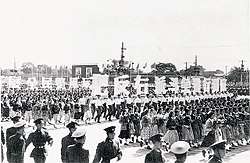Anti-Rightist Campaign
The Anti-Rightist Campaign (simplified Chinese: 反右运动; traditional Chinese: 反右運動; pinyin: Fǎnyòu Yùndòng) in the People's Republic of China, which lasted from 1957 to roughly 1959, was a political campaign to purge alleged "Rightists" within the Communist Party of China (CPC) and abroad.[1][2][3] The campaign was launched by Chairman Mao Zedong, but Deng Xiaoping and Peng Zhen also played an important role.[4][5] The Anti-Rightist Campaign significantly damaged democracy in China and turned the country into a de facto one-party state.[6][7][8][9][10]

| History of the People's Republic of China (PRC) |
|---|
.svg.png) |
|
Hu and the fourth generation |
| History of |
| Generations of leadership |
|
|
The definition of rightists was not always consistent, sometimes including critics to the left of the government, but officially referred to those intellectuals who appeared to favor capitalism, or were against one-party rule as well as collectivization.[4][8][10][11] According to China's official statistics during the "Boluan Fanzheng" period, the campaign resulted in the political persecution of at least 550,000 people.[6][11][12] Researchers estimate that the actual number of victims is between 1 to 2 millions or even higher.[2][11][13] Deng Xiaoping admitted that there were mistakes during the Anti-Rightist Campaign, and most victims had received rehabilitation since 1959.[11][14][15]
History
Background
The Anti-Rightist Campaign was a reaction against the Hundred Flowers Campaign which had promoted pluralism of expression and criticism of the government, even though initiation of both campaigns was controlled by Mao Zedong and were integrally connected.[16] Going perhaps as far back as the Long March there had been resentment against "rightists" inside the CPC, for example, Zhang Bojun.[17]
First wave
The first wave of attacks began immediately following the end of the Hundred Flowers movement in July 1957.[11] By the end of the year, 300,000 people had been labeled as rightists, including the writer Ding Ling. Future premier Zhu Rongji, then working in the State Planning Commission, was purged in 1958.[18] Most of the accused were intellectuals. The penalties included informal criticism, hard labor, and in some cases, execution.[11]
One main target was the independent legal system. Legal professionals were transferred to other jobs; judicial power was exercised instead by political cadres and the police.
Second wave
The second part of the campaign followed the Lushan Conference of July 2 – August 16, 1959. The meeting condemned General Peng Dehuai, who had criticised the Great Leap Forward.[19]
Rehabilitation
After Mao's death in 1976, many of the convictions were revoked during the Boluan Fanzheng period. At that time, under leader Deng Xiaoping, the government announced that it needed capitalists' experience to get the country moving economically, and subsequently the guilty verdicts of thousands of counterrevolutionary cases were overturned — affecting many of those accused of rightism and who had been persecuted for that crime the previous twenty two years.[20] This came despite the fact that Deng Xiaoping and Peng Zhen were among the most enthusiastic prosecutors of the movement during the "First Wave" of 1957.[4][5]
Censorship in China
In 2009, leading up the 60th anniversary of the PRC's founding, a number of media outlets in China listed the most significant events of 1957 but downplayed or omitted reference to the Anti-Rightist Movement.[12] Websites were reportedly notified by authorities that the topic of the movement was extremely sensitive.[12]
Famous Rightists
- Zhang Bojun, China's "number one rightist"
- Luo Longji, China's "number two rightist"
- Huang Qixiang
- Chen Mingshu
- Chen Mengjia
- Zhu Rongji, later Premier of China
- Wu Zuguang, playwright
- Qian Weichang
- Gu Zhun
See also
- Great Leap Forward
- Cultural Revolution
- List of CCP Campaigns
- Communist mass killings
- Communist terrorism
- Boluan Fanzheng
References
- "The Anti-Rightist Movement and Its Ideological and Theoretical Consequences". Chinese Law & Government. 2014-12-07. doi:10.2753/CLG0009-4609290436.
- Sun, Warren (2011-07-01). "Chinese Anti-Rightist Campaign (1957-) (CD-ROM). Editorial Board of the Chinese Anti-Rightist Campaign CD-ROM Database". The China Journal. 66: 169–172. doi:10.1086/tcj.66.41262814. ISSN 1324-9347.
- Sha, Shangzhi. "从反右运动看中国特色的政治斗争". Yanhuang Chunqiu. Retrieved 2020-07-18.
- Chung, Yen-lin (2011). "The Witch-Hunting Vanguard: The Central Secretariat's Roles and Activities in the Anti-Rightist Campaign". The China Quarterly (206): 391–411. ISSN 0305-7410.
- Wang, Ning (2020-04-28). "Victims and Perpetrators: Campaign Culture in the Chinese Communist Party's Anti-Rightist Campaign". Twentieth-Century China. 45 (2): 188–208. doi:10.1353/tcc.2020.0019. ISSN 1940-5065.
- King, Gilbert. "The Silence that Preceded China's Great Leap into Famine". Smithsonian. Archived from the original on 2019-10-14. Retrieved 2019-11-28.
- "PETITIONING FOR REDRESS OVER THE ANTI-RIGHTIST CAMPAIGN" (PDF). Human Rights in China. 2005.
- Liu, Zheng (2004-07-15). "反右运动对人民代表大会建设和工作的损害". www.people.cn (in Chinese). Archived from the original on 2020-06-09. Retrieved 2020-07-18.
- Du, Guang (2007). ""反右"运动与民主革命——纪念"反右"运动五十周年". Modern China Studies (in Chinese). Retrieved 2020-07-18.
- Mu, Guangren. "反右运动的六个断面". Yanhuang Chunqiu. Retrieved 2020-07-18.
- Vidal, Christine (2016). "The 1957-1958 Anti-Rightist Campaign in China: History and Memory (1978-2014)". Hal-SHS. Archived from the original on 2019-11-28. Retrieved 2019-11-28.
- "Uneasy silences punctuate 60th anniversary coverage". China Media Project. Archived from the original on 2010-06-11. Retrieved 2009-09-30.
- Wu, Weiguang (2007). "中共"八大"与"反右"运动". Modern China Studies. Retrieved 2020-07-18.
- "邓小平对"大跃进"的理解和认识--邓小平纪念网--人民网". cpc.people.com.cn. Retrieved 2020-07-18.
- "1957年反右运动". 北京大学人权与人道法研究中心 - Human Rights Online. Retrieved 2020-07-18.
- "Hundred Flowers Movement". Oxford Reference. doi:10.1093/oi/authority.20110803095950572. Retrieved 2020-07-18.
- The International PEN Award For Independent Chinese Writing Archived 2007-05-17 at the Wayback Machine, EastSouthWestNorth, retrieved 2007-01-19.
- "Four other prominent figures faced labels as rightists; one recovered, rose to premier". South China Morning Post. Retrieved 2020-07-18.
- "The Lushan Meeting and the Assertion of Absolute, Total Control by Mao Zedong". www.sjsu.edu. Retrieved 2020-07-18.
- Harry Wu; George Vecsey (December 30, 2002). Troublemaker: One Man's Crusade Against China's Cruelty. Times Books. pp. 68–. ISBN 0-8129-6374-1.
External links
- An Overview of Democracy Movements in China
- Petitioning for redress over the anti-rightist campaign – Human Rights in China (HRIC), 2005